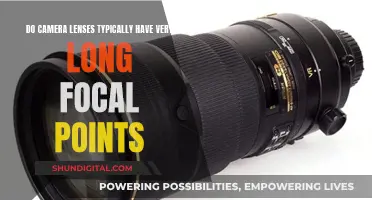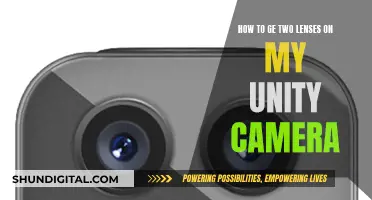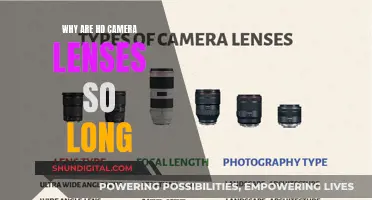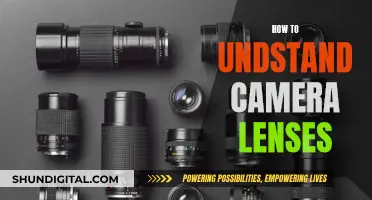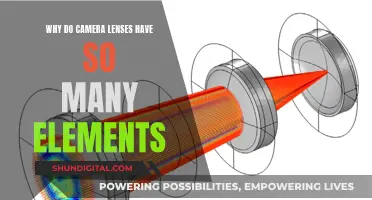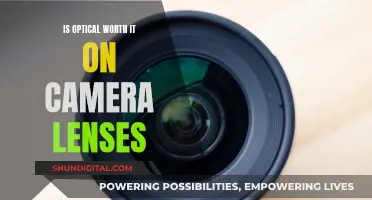
If you're looking to rent camera lenses in the Philippines, there are several options available to you. In Metro Manila, you can find companies like AV Studio Services, GFilm Rental, Independent Minds, and Creative Light, which offer a range of photography and videography equipment, including lenses, for rent. Additionally, online platforms such as Lensrentals, BorrowLenses, and LensProToGo provide rental services for camera lenses and other gear, shipping directly to your door. For local options in the Philippines, you can also consider companies like Cinerent (Philippines) Inc. and RSVP Film Studios, which cater to the film production industry and offer camera and lens rentals.
| Characteristics | Values |
|---|---|
| Companies | Lensrentals, BorrowLenses, LensProToGo, Cinerent Philippines Inc., AV Studio Services, GFilm Rental, Independent Minds, Creative Light |
| Available gear | Cameras, lenses, video gear, film production services, film post-production, film production materials, studio backdrops |
| Additional services | Shipping, studio rental |
What You'll Learn

Camera rental companies in the Philippines
There are several options for renting camera equipment in the Philippines, whether you're a photographer or videographer. Here are some companies to consider:
Lensrentals
Lensrentals offers a wide range of camera bodies, lenses, and other equipment for rent. They cater to both photographers and videographers by providing top-quality gear, including brands like Canon, Nikon, Olympus, Sony, and Leica. They offer convenient shipping options, ensuring your order arrives when you need it. Lensrentals also provides excellent customer support, with representatives available to chat during business hours.
BorrowLenses
BorrowLenses has joined the Lensrentals family and offers a comprehensive selection of camera and lens rentals. They serve photographers and videographers alike, providing access to top-quality gear whenever and wherever you need it.
AV Studio Services
AV Studio Services is a great option for those in Metro Manila. They offer a comprehensive list of photography and videography equipment for rent, including rental packages with everything you need to get started.
GFilm Rental
Also based in Metro Manila, GFilm Rental boasts a healthy lineup of cameras, lenses, and other gear. They cater to various photography needs, including studio backdrops for portrait photography.
Independent Minds
Independent Minds, another Metro Manila-based company, offers high-end gear primarily focused on cinema-level videography. However, some of their equipment, such as cameras and lenses, can also be used for photography.
Creative Light
If you're looking for a photography studio to rent, Creative Light provides studio rental services, giving you total creative control over your shoots.
Additionally, there are other companies and individuals in the Philippines that offer camera and lens rentals, some of which can be found through the iRent Mo app, providing a wide range of options to suit your photography and videography needs.
Cleaning Your Fujifilm XP Waterproof Camera Lens
You may want to see also

Types of camera lenses for different photography styles
There are a variety of options for renting camera lenses in the Philippines. BorrowLenses, Lensrentals, and RSVP Film Studios are some of the companies that offer camera lens rental services in the country.
Now, let's dive into the different types of camera lenses for various photography styles.
Prime vs. Zoom Lenses
The two main categories of camera lenses are prime and zoom lenses. Prime lenses have a fixed focal length, resulting in higher-quality images. They are also lighter and more affordable. On the other hand, zoom lenses offer variable focal lengths, making them more versatile and suitable for various photography scenarios.
Standard Lenses
Standard lenses have a focal length between 35mm and 85mm, offering a field of view similar to the human eye. They are commonly used by street, travel, and portrait photographers due to their natural field of vision.
Wide-Angle Lenses
Wide-angle lenses have a focal length between 14mm and 35mm, providing a wide field of vision. They are essential for landscape photography, as they capture large, spacious scenes and stretch the horizon. Wide-angle lenses are also useful for architecture and real estate photography, as they can capture entire buildings or rooms without the need to move far away.
Telephoto Lenses
Telephoto lenses offer a high level of magnification, allowing photographers to capture faraway subjects. They are commonly used in sports and wildlife photography, as they enable photographers to capture intimate images of distant subjects.
Super-Telephoto Lenses
Super-telephoto lenses provide an even greater level of magnification than standard telephoto lenses, with focal lengths above 300mm. They are large, heavy, and expensive but offer exceptional image detail. They are often used in sports, wildlife, and astrophotography.
Macro Lenses
Macro lenses allow photographers to capture tiny objects at very close range. They are defined by their ability to focus at extremely close distances rather than their focal length, which can vary from 35mm to 200mm.
Tilt-Shift Lenses
Tilt-shift lenses enable photographers to distort and change the perspective of an image by manipulating the focal plane. They are commonly used in architectural photography to ensure that buildings appear straight and vertical in the frame.
Fisheye Lenses
Fisheye lenses are ultra-wide-angle lenses with a focal length of less than 14mm. They create a warped, curved effect around the edges of the image, similar to looking through a fish's eye. These lenses are used for visual effects in fine art photography and extreme sports photography.
Camera Lenses: Do They Have an Expiry Date?
You may want to see also

How to choose the right gear before renting
Renting camera gear is a great way to save money and try out new equipment before buying. Here are some tips on how to choose the right gear before renting:
Know Your Needs
Before renting camera gear, it's important to assess your needs and the type of photography or videography you'll be doing. Different projects require different types of gear. For example, if you're shooting a music video, you may need continuous LED lights with softboxes and DSLR video monitors. If you're doing portrait photography, a wide-angle lens might be more suitable. Knowing what you need will help you choose the right gear and avoid unnecessary expenses.
Research and Compare
Do your research on the different camera gear options available. Compare prices, features, and specifications to find the best fit for your needs. Read reviews and watch product videos to get a better understanding of the gear's capabilities and limitations. Consider seeking advice from photography forums, blogs, or experts in the field.
Try Before You Buy
Renting camera gear allows you to try out different equipment before committing to a purchase. This is especially useful if you're considering investing in expensive gear. By renting first, you can test out the latest cameras, lenses, and accessories to see if they suit your style and meet your requirements. This way, you can make a more informed decision and ensure you're happy with your purchase.
Consider Rent-to-Own Options
Some companies offer rent-to-own programs, which can be a great way to try out the gear while working towards owning it. With these programs, you can rent the equipment for a set period and decide to purchase it at any time during the rental. This option provides flexibility and allows you to test the gear thoroughly before making a long-term commitment.
Plan and Reserve
When you've decided on the gear you want to rent, plan ahead and reserve the items in advance to ensure their availability. Consider the timing of your shoot and factor in delivery or pickup options. Allow for enough time to familiarise yourself with the rented gear before your project starts. Additionally, don't forget to include rental costs in your budget and client negotiations, if applicable.
By following these steps, you can make informed choices when renting camera gear. Remember to consider your specific needs, do your research, and take advantage of the flexibility that renting provides. Happy shooting!
How to Safely Remove and Clean Your Camera Lens
You may want to see also

Pros and cons of renting vs buying
There are several companies in the Philippines that allow you to rent camera lenses, including RSVP Film Studios and Lensrentals.com.
If you're looking for advice on whether to rent or buy camera lenses, there are several pros and cons to each option.
Renting Camera Lenses
Renting camera lenses can be a great option if you want to save money in the long run. Camera equipment is expensive, and if you're an enthusiast or a professional, renting can be a more affordable way to access the best tools for the job. Renting is ideal if you work on various photography projects consecutively, such as weddings, products, sports events, and portraits, as it allows you to change your setup at short notice. It also gives you access to a wide range of lenses from different brands, so you can experiment with different setups. Additionally, renting can be a good way to try out a lens or camera before committing to buying it.
Buying Camera Lenses
One of the main advantages of buying camera lenses is that you'll always have them in your inventory, which is essential for creativity, spontaneity, and regular practice. If you're a photographer who shoots on the fly, such as when particular weather conditions arise or when a rare wildlife species appears, having your equipment readily available is crucial. Additionally, buying can be more cost-effective in the long run, as you won't have to pay rental fees each time you need the equipment.
Both renting and buying camera lenses have their advantages and disadvantages. Renting can be more cost-effective and flexible, while buying can provide you with the security of always having the equipment you need on hand. Ultimately, the decision to rent or buy depends on your specific needs and circumstances as a photographer.
Understanding Camera Lenses: Capturing Unique Perspectives
You may want to see also

Cheap camera gear rental options
There are several options for renting camera gear in the Philippines, with companies offering a range of equipment to suit your needs. Here are some cheap camera gear rental options to consider:
Lensrentals
Lensrentals offers a wide range of camera bodies, lenses, and other equipment for rent. They cater to photographers and videographers by providing top-quality gear that can be shipped to arrive on your desired date. The company offers products from well-known brands such as Canon, Nikon, Olympus, Sony, and Leica. You can browse their inventory online and easily place your order.
I-Tech Digital Productions
I-Tech Digital Productions provides professional HD camera rentals and audio-visual equipment. They offer 4K HD cameras and PTZ robotic cameras, ensuring that you have the necessary tools for your filming needs. Contact them directly by phone to discuss your requirements and arrange your rental.
RSVP Film Studios
RSVP Film Studios caters to film production services and equipment rental in the Philippines. They provide a versatile range of video equipment, DSLR cameras, and film production materials. The studio offers equipment from brands like ARRI, RED Digital, Phantom Flex, Canon, Sony, and Panasonic. RSVP Film Studios can help you acquire the right tools for projects ranging from motion pictures and commercials to corporate AVPs.
These companies offer affordable options for renting camera gear in the Philippines. Compare their offerings, pricing, and availability to find the best fit for your specific requirements and budget.
Finding the Right Camera Body for Your EF-M Lenses
You may want to see also
Frequently asked questions
There are a few options for renting camera lenses in the Philippines. Some companies that offer this service include Cinerent (Philippines) Inc., AV Studio Services, GFilm Rental, Independent Minds, and Creative Light. You can also try online platforms such as Lensrentals, BorrowLenses, and LensProToGo, which provide shipping services.
The availability of camera lenses for rent varies across different companies. Common types of lenses offered include prime lenses, zoom lenses, wide-angle lenses, and telephoto lenses. Some companies may also provide specialty lenses like anamorphic or fisheye lenses.
The choice of lens depends on the type of photography you intend to do. For portrait photography, a medium to long focal length lens (50mm to 85mm) with a fast aperture (f/1.8-f/1.4 or lower) is ideal. Street photographers often prefer a light camera body with a mirrorless APS-C camera and a lens focal length ranging from 35mm to 50mm. For landscape photography, a wide-angle lens of 24mm or wider is suggested.
Renting camera lenses offers several advantages. Firstly, it is a cost-effective way to access high-quality gear without the need for a significant financial investment. Secondly, renting allows you to experiment with different lenses to find the ones that suit your photography style and needs. Finally, rental services provide flexibility, especially when you require specific lenses for particular projects or occasions.
The process of renting a camera lens online is generally straightforward. Visit reputable websites like Lensrentals or BorrowLenses, browse their inventory, and select the desired lens. Specify the rental period and shipping details, including the delivery and return dates. Some websites may require you to create an account and provide payment information. Carefully read the rental terms and conditions, as well as the return policies, to ensure a smooth transaction.


